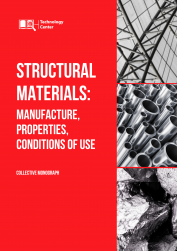The influence of external actions and methods of alloying alloys on the operational characteristics of cast products
Synopsis
The chapter presents the results of scientific research on the influence of electromagnetic stirring and alloying on the properties of deformable aluminum alloys, the influence of alloying elements on the phase state and structural stability of heat-resistant corrosion-resistant alloys, which are used for the manufacture of turbine blades of gas turbine engines (GTE), is analyzed. The results of studies on the effect of alloying a heat-resistant nickel-based alloy with tantalum and rhenium on its operational characteristics are presented.
The influence of excess pressure on the properties and quality of castings from iron-carbon alloys during lost foam casting is determined.
It is determined that under the controlled influence of technological factors and excess pressure (2...6 MPa) on liquid metal and during its crystallization, it is possible to increase the mechanical strength and reduce the porosity of cast iron and steel castings by 15...30 %, compared to gravity casting according to models, which are gasified.
The latest technological processes for the production of ordinary and reinforced castings with specified properties by casting according to gasified models, using excess pressure on the metal, have been developed.
The work carried out by the authors at the Physical and Technological Institute of Metals and Alloys of the National Academy of Sciences of Ukraine is of high scientific and practical importance for the production of high-quality foundry products and will be useful for foundry product manufacturers, scientific and scientific-pedagogical workers of the specialty "Metallurgy" (Foundry production).








